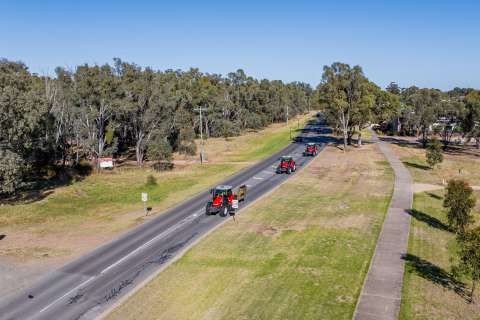A successful rehabilitation and employment program – aiming to increase employment to reduce offending – is building better futures for prisoners who are released into the community.
Work Ready, Release Ready PLUS supports participants with education and training while incarcerated and post-release, helping them to find a job after exiting custody.
The voluntary program, delivered by Workskil Australia, has attracted more than 1,500 enrolments since it was established in 2018 – with more than half of graduates going on to secure stable employment.
It has been a key contributor to South Australia achieving the lowest reoffending rate in the country and meeting its target of reducing reoffending by 10 per cent by 2020.
Participant, Ansialey, is one example of the program’s success – now working as a qualified scaffolder on building sites for Indigenous contracts and construction business, Intract Australia.
The 38-year-old former tuna boat fisherman has been employed for four months and secured his new role following a job interview lined up through the program – one week after his release from Mobilong Prison.
The State Government has committed an additional $6.3 million to increase access to the program, expanding it from 500 participants to 800 amid high demand.
The expansion also includes more regional prisons (Mount Gambier and Port Lincoln) and extra support for Aboriginal participants, with a target to boost the proportion of this group to 40 per cent of total participants.
Prisons already running the program comprise Mobilong Prison, Cadell Training Centre, Port Augusta Prison, Yatala Labour Prison, Adelaide Women’s Prison and the Adelaide Pre-release Centre.
Work Ready, Release Ready PLUS aims to meet or even exceed the Government’s new target of a 20 per cent reduction in reoffending by 2026.
The program’s effectiveness was recently recognised at the SA Training Awards, which also acknowledged Road to Redemption – a pre-employment program for Aboriginal and Torres Strait Islander former offenders, developed in partnership with Workskil Australia, Carey Training and the Department for Correctional Services.
As put by Dan Cregan
This program paves the way for meaningful employment and has a proven track record of success.
Giving participants an opportunity to enter the workforce and build their futures helps keep prisoners from reoffending upon their release.
Hands-on training and ongoing support to find and secure a job are important factors in South Australia having the lowest recidivism rate in the nation.
As put by Department for Correctional Services CEO David Brown
Work Ready, Release Ready PLUS is an incredibly effective program translating to positive outcomes for participants, their families, local employers and businesses and is now available across eight facilities in South Australia.
Thanks to this additional investment by the Government, the program is now able to support Aboriginal and Torres Strait Islander people who are on remand or short-term sentences.
We are pleased to continue our partnership with Workskil Australia and look forward to seeing the meaningful contribution the program can make to the lives of participants.
As put by Work Ready, Release Ready participant Ansialey
I wanted a better life. I wanted to change my life not just for a while but for good. It started with showing up.
I’m working with a great bunch of people who support each other, and they’ve definitely helped me get through some times when it’s been hard.
There are other people in prison who don’t think they can change their lives but they can.
They don’t know there are people out there who will believe in you and give you a chance. Hopefully, through me, they can see that.
As put by Workskil Australia Ltd CEO Nicole Dwyer
Over the last six years, more than 55 per cent of participants of Work Ready, Release Ready have gone on to secure paid employment.
Importantly, evaluation also shows the program is effective in reducing re-offending including among those at high risk of recidivism.
By supporting participants to gain skills, this increases their motivation, capacity and capability to gain and sustain work after they are released.








